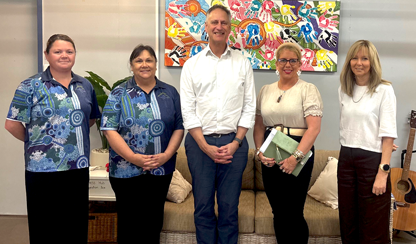14 November 2025
Institute news

In the lead-up to World Diabetes Day on 14 November, we caught up with Erin — a Clinical Research Coordinator and Project Manager who's spent over 20 years championing diabetes research and clinical trials.
Erin's hands-on clinical experience across hospitals, aged care facilities, and pathology still shapes everything she does in research today. Erin's work has spanned type 1 and type 2 diabetes studies to cutting-edge artificial pancreas systems and initiatives supporting Indigenous Australians in regional and remote communities.
Erin, you’re a clinical research coordinator often working on diabetes trials. As someone with type 1 diabetes, how does this influence your feelings about your future health?
It gives me hope — being involved in research means I see firsthand the innovations that could improve my own future and the lives of others with diabetes.
What don’t people without diabetes appreciate enough about this condition?
That it’s relentless — even with advanced tools like Continuous Glucose Monitors (CGMs) and pumps, it still requires constant attention, decision-making, and resilience every single day. You can’t have a holiday from it ever.
What’s the biggest change you’ve witnessed in your life in terms of managing your condition?
When I started managing my diabetes at 14, I used urine tests and syringes. Now I use automated insulin delivery with CGM — it’s been a remarkable transformation in accuracy, safety, and freedom.
World Diabetes Day this year is focusing on creating more supportive and inclusive work environments for people living with the condition. What should workplaces be focusing on?
Workplaces should prioritise flexibility, understanding, and practical support — like allowing time for glucose checks, access to hypo treatment, and reducing stigma around chronic conditions.
You’re in a unique position given your condition and your role here at the Institute. What gets you excited about your work?
I’m excited by the potential to improve care and outcomes for people with diabetes — especially knowing that the research I help coordinate could directly benefit people like me.

